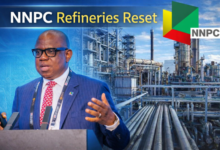Nigeria’s GDP Rebase: Why Industrialisation Must Now Take Centre Stage – MAN

Nigeria’s newly rebased Gross Domestic Product (GDP) figures may paint a picture of a larger economy, but industry leaders warn that beneath the statistical gloss lies a critical truth: Nigeria remains under-industrialised and structurally fragile.
This was the key message from the Manufacturers Association of Nigeria (MAN), as its Director-General, Segun Ajayi-Kadri, responded to the National Bureau of Statistics (NBS) report showing GDP growth of 3.13% in Q1 2025, up from 2.27% in the same quarter of 2024.
While the numbers suggest a recovering economy, MAN cautioned against misplaced optimism, pointing out that real growth remains weak, and that the GDP rebasing exercise reveals a deeper structural concern: the continued marginalisation of industry in the Nigerian economy.
GDP Rebasing: Bigger, But Not Better?
GDP rebasing, which involves updating the base year to reflect more current economic realities, is a routine statistical exercise. Nigeria’s latest rebase shifts the benchmark year from 2010 to 2019, expanding the country’s nominal GDP to $243 billion.
But Ajayi-Kadri warned that the growth in size does not equate to productivity or structural resilience. He noted that:
“While the rebased GDP confirms a more statistically diverse economy, it simultaneously exposes the chronic underperformance of industry—especially manufacturing, which should be the engine room of sustainable economic transformation.”
According to MAN, industry’s share of GDP has declined from 27.65% in the 2010 base year to just 21.08% in the 2019 structure, signifying a worrying drift from production to low-productivity service activities.
A Call to Re-Industrialise Nigeria
Rather than celebrating the nominal growth, MAN insists the GDP rebase must be seen as a wake-up call for bold structural reforms and a manufacturing-led growth strategy.
Ajayi-Kadri said:
“The real problem is not the size of GDP but the productivity of the economy. Without a strong industrial base, GDP expansion becomes a hollow statistic—one that doesn’t create jobs, reduce poverty, or drive export capacity.”
He called on the Federal Government to prioritise industrialisation as the cornerstone of macroeconomic policy, with urgent focus on:
- Manufacturing-focused infrastructure investments
- Improved access to long-term industrial finance
- Sector-specific interventions for textiles, autos, and agro-processing
- Energy reliability and stable power for industrial clusters
- Local content incentives and smart trade policies
Investor Confidence vs Real Economic Gains
The rebased GDP may improve macroeconomic optics—lowering Nigeria’s debt-to-GDP ratio and improving its global ranking—but MAN argues that real investor confidence hinges on more than statistical size.
“Confidence is earned through structural depth, policy consistency, and industrial competitiveness—not GDP headlines,” Ajayi-Kadri added.
He lauded the efforts of the Industrial Revolution Working Group but called for its agenda to be elevated and embedded across Ministries, Departments, and Agencies (MDAs) as a central pillar of Nigeria’s development plan.
Rebasing Without Reforms Is Cosmetic
For analysts and development economists, the real concern is that without industrial reform and value-added production, Nigeria risks becoming a consumption-driven economy overdependent on the informal sector and primary commodities.
Ajayi-Kadri’s position reinforces a broader truth: GDP rebasing alone cannot mask weak fundamentals. Instead, it should catalyse a shift toward high-impact, inclusive growth strategies.
Conclusion: Time for Industrial Policy With Teeth
The message from the manufacturing sector is clear: Nigeria cannot grow its way out of poverty or unemployment without rebuilding its industrial foundation.
GDP rebasing may adjust Nigeria’s economic mirrors—but only industrialisation can fix the engine.












